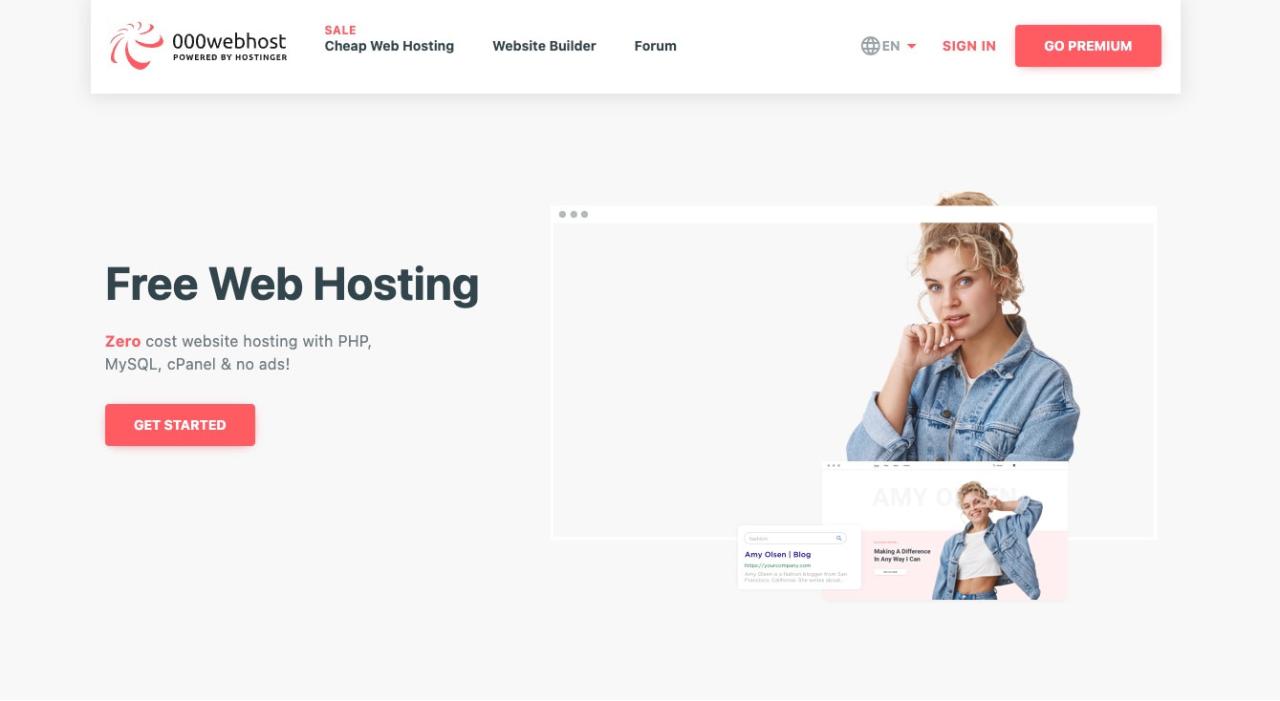Free shared hosting is an attractive option for website owners, especially those just starting out. It offers a low-cost entry point to the world of web development, allowing individuals to establish an online presence without initial financial investment. This type of hosting shares server resources with multiple websites, which can lead to limitations in performance and scalability. However, it remains a viable choice for simple websites with moderate traffic, particularly for those who are learning the ropes of web development.
Understanding the nuances of free shared hosting is crucial for making informed decisions. This guide explores the advantages and disadvantages, the intricacies of how it works, and the potential pitfalls to consider. It also delves into finding reliable providers, exploring alternatives, and addressing security and performance concerns. By understanding the fundamentals of free shared hosting, you can make a well-informed choice that aligns with your website’s needs and goals.
What is Free Shared Hosting?
Free shared hosting is a type of web hosting where multiple websites share the same server resources, such as CPU, RAM, and storage space. This means that your website shares the server’s resources with other websites hosted on the same server. This sharing of resources typically results in lower costs for hosting, making it a popular option for individuals and small businesses with limited budgets.
Free shared hosting provides a basic platform for launching a website, but it often comes with certain limitations and restrictions. These limitations are designed to manage server resources efficiently and ensure fair usage for all users.
Advantages of Free Shared Hosting
Free shared hosting offers several advantages, making it an attractive option for budget-conscious website owners.
- Cost-Effective: Free shared hosting is a cost-effective solution for individuals and small businesses looking to establish an online presence without significant upfront investment. It eliminates the need for monthly or annual hosting fees, allowing you to focus on building your website and content.
- Easy to Use: Most free shared hosting providers offer user-friendly control panels and interfaces, simplifying the process of setting up and managing your website. These platforms often include one-click installers for popular content management systems (CMS) like WordPress, making website creation more accessible.
- Ideal for Beginners: Free shared hosting provides a good starting point for individuals new to web development. It allows you to experiment with website building, learn basic web hosting concepts, and gain experience without financial risk.
Disadvantages of Free Shared Hosting
While free shared hosting offers cost-effectiveness and convenience, it also comes with certain drawbacks that you should consider.
- Limited Resources: Free shared hosting plans often come with limited resources, such as storage space, bandwidth, and processing power. These limitations can affect your website’s performance, especially during peak traffic hours, leading to slow loading times and potential downtime.
- Performance Issues: Sharing server resources with other websites can lead to performance issues, particularly if other websites on the server experience high traffic. This can result in slow loading times, decreased website responsiveness, and even temporary website outages.
- Limited Features: Free shared hosting plans typically offer a limited set of features compared to paid hosting plans. You may have restricted access to advanced features like email accounts, databases, and security tools. These limitations can hinder your website’s functionality and growth potential.
- Advertising: Many free shared hosting providers display ads on your website to generate revenue. These ads can detract from your website’s aesthetics and user experience, potentially impacting visitor engagement and brand perception.
- Security Concerns: Free shared hosting plans often have limited security features, making your website more vulnerable to security threats such as malware attacks and data breaches. The shared server environment can also increase the risk of your website being affected by security vulnerabilities on other websites hosted on the same server.
Limitations and Restrictions of Free Shared Hosting
Free shared hosting typically comes with limitations and restrictions designed to manage server resources effectively and ensure fair usage for all users. These limitations can impact your website’s functionality and performance.
- Storage Space: Free shared hosting plans often have limited storage space, restricting the amount of data you can store on your website. This can be a challenge if you plan to host large files, such as images, videos, or databases. You may need to consider alternative storage solutions or upgrade to a paid hosting plan if you require more storage space.
- Bandwidth: Bandwidth refers to the amount of data that can be transferred between your website and visitors. Free shared hosting plans often have limited bandwidth, which can restrict the number of visitors your website can handle simultaneously. This can lead to slow loading times and potential website outages during peak traffic hours.
- Script Execution: Some free shared hosting plans may restrict the execution of certain scripts, particularly those that consume significant server resources. This can limit the functionality of your website, especially if you plan to use complex applications or scripts. You may need to consider alternative solutions or upgrade to a paid hosting plan if you require more script execution capabilities.
- Domain Name: Free shared hosting plans typically require you to use a subdomain of the hosting provider’s domain. This means your website’s address will include the hosting provider’s domain name, such as “yourwebsite.freehost.com.” This can impact your website’s branding and professionalism, especially if you are looking to establish a strong online presence.
- Technical Support: Free shared hosting plans often offer limited technical support, which can be challenging if you encounter technical issues with your website. You may have to rely on online forums or community support for assistance, which can be time-consuming and frustrating.
- Website Features: Free shared hosting plans typically offer a limited set of features, such as email accounts, databases, and security tools. You may have to upgrade to a paid hosting plan to access these features, which can add to your overall costs.
How Free Shared Hosting Works
Free shared hosting is a type of web hosting where multiple websites share the same server resources. This is a cost-effective option for individuals and small businesses with low website traffic and resource requirements.
Resource Allocation and Sharing
In a shared hosting environment, resources like CPU, RAM, disk space, and bandwidth are allocated to all websites on the server. The server’s resources are divided among the websites, and each website receives a portion of the total available resources.
- CPU: The central processing unit (CPU) is responsible for executing website code and processing requests. In shared hosting, each website shares the server’s CPU power, with the amount allocated to each website depending on factors like traffic and resource usage.
- RAM: Random access memory (RAM) is used to store data that the server needs to access quickly. Shared hosting platforms allocate RAM to each website, allowing them to load and process data efficiently. The amount of RAM allocated depends on the hosting plan and the number of websites sharing the server.
- Disk Space: Shared hosting provides each website with a specific amount of disk space to store website files, including HTML, CSS, images, and databases. The allocated disk space is typically limited, but sufficient for basic websites with limited content.
- Bandwidth: Bandwidth refers to the amount of data that can be transferred between the server and users’ browsers. In shared hosting, bandwidth is shared among all websites on the server. Websites with high traffic may experience slower loading times or limitations on data transfer if the shared bandwidth is insufficient.
Simplified Illustration of Website Data Storage and Access
Imagine a large apartment building where each apartment represents a website. The building itself represents the shared hosting server, and the residents in each apartment are the website visitors. When a visitor requests a web page, their request is sent to the server, which locates the corresponding apartment (website) and retrieves the requested data. This data is then sent back to the visitor’s browser, displaying the web page.
Finding Reliable Free Shared Hosting Providers

Finding a reliable free shared hosting provider can be challenging. Many providers offer free plans, but they often come with limitations and may not be suitable for all websites. It is crucial to carefully evaluate the provider’s reputation, features, and limitations before making a decision.
Factors to Consider When Choosing a Free Shared Hosting Provider
To ensure a smooth and reliable experience, consider the following factors when choosing a free shared hosting provider:
- Reputation: Look for providers with a proven track record and positive reviews from other users. You can find reviews on websites like HostAdvice, WebHostingTalk, and Trustpilot.
- Features: Free plans often have limited features, such as storage space, bandwidth, and email accounts. Ensure the provider offers the features you need for your website.
- Limitations: Understand the limitations of free plans, such as restrictions on website traffic, file size, and scripting languages. Some providers may also display ads on your website or require you to link back to their website.
- Customer Support: Free providers may offer limited or no customer support. If you encounter issues, ensure you have access to resources or support channels to resolve them.
Reputable Free Shared Hosting Providers
Several reputable free shared hosting providers offer basic website hosting services. These providers have a decent track record and provide reliable service within the limitations of their free plans. Here are a few examples:
- 000Webhost: This provider offers a free shared hosting plan with 1GB of disk space, 10GB of bandwidth, and a free domain name. They also provide a website builder and a control panel for managing your website.
- Freehostia: Freehostia offers a free shared hosting plan with 250MB of disk space, 6GB of bandwidth, and a free domain name. They also provide a website builder and a control panel for managing your website.
- InfinityFree: InfinityFree offers a free shared hosting plan with 10GB of disk space, unlimited bandwidth, and a free domain name. They also provide a website builder, a control panel for managing your website, and free SSL certificates.
Comparing Features and Limitations
Here is a table comparing the features and limitations of the free shared hosting providers mentioned above:
| Provider | Disk Space | Bandwidth | Free Domain | Website Builder | Control Panel | Other Features | Limitations |
|---|---|---|---|---|---|---|---|
| 000Webhost | 1GB | 10GB | Yes | Yes | Yes | Free SSL certificate | Ads on websites, limited features |
| Freehostia | 250MB | 6GB | Yes | Yes | Yes | Free SSL certificate | Limited features, low disk space |
| InfinityFree | 10GB | Unlimited | Yes | Yes | Yes | Free SSL certificate, unlimited bandwidth | Ads on websites, limited features |
Tips for Evaluating Reliability and Trustworthiness
When choosing a free shared hosting provider, it’s essential to evaluate their reliability and trustworthiness. Here are some tips:
- Check their website: Look for a professional and well-maintained website. A poorly designed website can be a red flag.
- Read reviews: Check online reviews from other users to see what they have to say about the provider’s service and reliability.
- Look for customer support options: Ensure the provider offers adequate customer support options, such as live chat, email, or phone support.
- Check their uptime guarantee: A reputable provider should offer an uptime guarantee, which ensures your website is available for a certain percentage of the time.
Resources for Finding Reliable Free Shared Hosting Providers
Several online resources can help you find reliable free shared hosting providers. Here are a few examples:
- HostAdvice: This website provides reviews and comparisons of different web hosting providers, including free shared hosting options.
- WebHostingTalk: This forum allows users to discuss web hosting providers and share their experiences.
- Trustpilot: This website provides user reviews and ratings for different businesses, including web hosting providers.
Free Shared Hosting for Specific Needs
Free shared hosting can be a valuable resource for certain types of websites and projects. However, it’s essential to understand its limitations before deciding if it’s the right fit for your needs.
Free shared hosting is often suitable for basic websites with low traffic and limited resource requirements. Here are some specific website projects that might benefit from free shared hosting:
Personal Websites and Blogs
Personal websites and blogs are often low-traffic websites that don’t require extensive resources. Free shared hosting can be a good option for these projects, allowing individuals to share their thoughts, experiences, and ideas with the world without incurring significant costs.
Portfolio Websites
Portfolio websites are designed to showcase the work and skills of individuals or businesses. These websites typically have a simple design and limited content, making them suitable for free shared hosting.
Landing Pages
Landing pages are single-page websites designed to capture leads or promote a specific product or service. They usually have minimal content and focus on driving conversions, making them ideal for free shared hosting.
Non-Profit Organizations
Non-profit organizations often have limited budgets and may find free shared hosting a cost-effective solution for their websites. However, it’s important to ensure that the free hosting provider meets the specific needs of the organization.
Small Business Websites
Small businesses with limited budgets and low traffic may find free shared hosting a suitable option for their initial online presence. However, as the business grows and traffic increases, they may need to upgrade to a paid hosting plan.
Limitations of Free Shared Hosting for Specific Websites
Free shared hosting may not be suitable for all types of websites, especially those with high traffic or demanding resource requirements.
High-Traffic Blogs and Websites
High-traffic blogs and websites require significant resources, including bandwidth, storage, and processing power. Free shared hosting typically has limited resources, which can lead to slow loading times, frequent downtime, and other performance issues.
E-commerce Platforms
E-commerce platforms require secure payment processing, reliable performance, and sufficient storage for product images and data. Free shared hosting often lacks the security features, performance, and storage capacity needed for a successful e-commerce website.
Websites with Large Media Files
Websites with large media files, such as videos or high-resolution images, require significant storage space. Free shared hosting typically has limited storage, which can limit the size and number of files that can be uploaded.
Websites with Complex Functionality
Websites with complex functionality, such as online forums or membership areas, often require specific software and configurations. Free shared hosting may not support the necessary software or have the flexibility to accommodate custom configurations.
Security and Privacy Considerations
Free shared hosting, while offering a cost-effective solution, comes with inherent security and privacy risks. It’s crucial to understand these potential vulnerabilities and implement appropriate measures to protect your website and user data.
Security Risks Associated with Free Shared Hosting
Sharing a server with multiple websites means that your website is vulnerable to attacks that target other websites on the same server. If one website is compromised, attackers could potentially gain access to your website as well. This vulnerability is amplified by the limited resources and security features typically offered by free shared hosting providers.
Data Handling and Privacy Practices
Free shared hosting providers often have less stringent data privacy policies compared to paid hosting providers. They may collect and use user data for various purposes, including targeted advertising and data analytics. It’s important to carefully review the provider’s terms of service and privacy policy to understand how your data is handled.
Best Practices for Protecting Website Security and Data Privacy
- Choose a reputable free shared hosting provider: Research the provider’s security practices, customer reviews, and track record. Look for providers with strong security features, such as firewalls, malware scanning, and regular security updates.
- Use strong passwords and two-factor authentication: Protect your account with strong passwords and enable two-factor authentication whenever possible. This adds an extra layer of security and makes it harder for unauthorized users to access your website.
- Keep your website and software up to date: Regularly update your website’s content management system (CMS), plugins, and themes to patch vulnerabilities and improve security. Outdated software is a prime target for attackers.
- Use an SSL certificate: An SSL certificate encrypts the communication between your website and visitors, protecting sensitive information like login credentials and credit card details. Free shared hosting providers may offer free SSL certificates, but it’s important to verify their validity and reliability.
- Limit user access and permissions: Only grant access to your website to authorized individuals and limit their permissions to what is necessary for their roles. This helps prevent unauthorized access and data breaches.
- Back up your website regularly: Create regular backups of your website’s data to ensure you can restore it in case of a security breach or accidental data loss. Backups can be stored locally or on a cloud storage service.
- Monitor your website for suspicious activity: Regularly monitor your website’s logs for any unusual activity, such as failed login attempts or unusual traffic patterns. This can help detect potential security breaches early on.
Future of Free Shared Hosting
Free shared hosting has been a popular choice for individuals and small businesses looking for an affordable way to get their website online. However, with the ever-changing landscape of technology and the increasing demand for more robust hosting solutions, the future of free shared hosting remains uncertain. This section explores the potential trends and changes in the free shared hosting landscape, analyzes the long-term viability of free shared hosting models, and examines how technological advancements might impact the future of free shared hosting.
Potential Trends and Changes, Free shared hosting
The free shared hosting landscape is likely to undergo significant changes in the coming years. Some of the potential trends include:
- Increased competition: The number of free shared hosting providers is likely to increase as more companies enter the market. This will lead to more competition, which could result in lower prices, improved features, and better customer service.
- Focus on niche markets: Free shared hosting providers may begin to focus on specific niche markets, such as bloggers, small businesses, or educational institutions. This will allow them to provide more specialized services and cater to the unique needs of their target audience.
- Integration with other services: Free shared hosting providers may start to integrate their services with other platforms, such as social media or e-commerce. This will make it easier for users to manage their online presence and reach a wider audience.
- Emphasis on security and privacy: As cyber threats become more sophisticated, free shared hosting providers will need to place a greater emphasis on security and privacy. This will involve implementing stronger security measures and offering features that protect user data.
Long-Term Viability of Free Shared Hosting Models
The long-term viability of free shared hosting models is a subject of debate. Some experts believe that free shared hosting will continue to thrive, while others argue that it is unsustainable in the long run.
- Challenges: Free shared hosting providers face several challenges, including the need to generate revenue, the cost of maintaining their infrastructure, and the risk of attracting malicious users. To overcome these challenges, free shared hosting providers may need to adopt new business models, such as offering premium features for a fee or partnering with other companies to generate revenue.
- Opportunities: Despite the challenges, free shared hosting providers have several opportunities for growth. The increasing popularity of online content, the rise of social media, and the growing demand for affordable hosting solutions are all factors that could drive the growth of free shared hosting.
Impact of Technological Advancements
Technological advancements are likely to have a significant impact on the future of free shared hosting.
- Cloud computing: The rise of cloud computing has made it easier and more affordable for businesses to provide hosting services. This has led to the emergence of new free shared hosting providers and has increased competition in the market.
- Artificial intelligence (AI): AI is being used to automate many tasks in the hosting industry, such as server management and customer support. This could lead to lower costs for free shared hosting providers, which could benefit users.
- Internet of Things (IoT): The growth of the IoT is creating a demand for more powerful and reliable hosting solutions. This could lead to the development of new free shared hosting options that are specifically designed for IoT devices.
Outcome Summary: Free Shared Hosting

Free shared hosting, while offering a convenient starting point, has inherent limitations. As your website grows and demands more resources, it might be necessary to consider a paid hosting solution that provides greater flexibility and control. Weighing the pros and cons of free shared hosting against your specific website needs will ultimately guide you toward the most suitable hosting option.




